
Brainy:Exercise led to an enlarged hippocampus in the survey
Exercise in middle and old age could improve your memory, reducing the risk of dementia.
In a year-long U.S. study, 120 volunteers aged between 50 and 80 were asked to build up to walking 40 minutes a day three times a week or to do some simple stretching regularly.
The participants' brains were scanned at the start and end of the experiment to study the size of the hippocampus, the part of the brain which forms new memories.
In those who did the stretches, the hippocampus shrunk by around 1.5 per cent, which is normal.
But in the walkers, the hippo-campus had not only not shrunk, it was bigger at the end of the study than at the start.
The increase of around two per cent meant the 'memory hub' was up to two years younger, leading to improvements in spatial memory, the journal Proceedings of the National Academy of Sciences reports.
This is the kind of memory that helps us remember how to get to a certain place, or where we have left the house keys. Loss of spatial memory often becomes a problem in old age.
Research leader Professor Kirk Erickson, from the University of Pittsburgh, said: 'We think of the atrophy of the hippocampus in later life as almost inevitable.
'But we've shown that even moderate exercise for one year can increase the size of that structure.
'The brain at that stage remains modifiable.'

Shrinkage: People who only stretched instead of walking saw their hippocampus get smaller
Co-author Art Kramer, director of the Beckman Institute at the University of Illinois, said: 'The results of our study are particularly interesting in that they suggest that even modest amounts of exercise by sedentary older adults can lead to substantial improvements in memory and brain health.
'Such improvements have important implications for the health of our citizens and the expanding population of older adults worldwide.'
Simon Ridley , head of research at the Alzheimer's Research Trust, said: 'Although this study doesn't look at memory loss in Alzheimer's or dementia, it suggests it's never too late to start exercising to help keep our brains healthy.
'Even modest exercise may improve memory and help protect the brain from normal decline caused by ageing.
'Increasing evidence suggests regular exercise and a healthy diet may help reduce our risk of developing dementia, as well as reaping numerous other benefits from living a healthy lifestyle.'





No comments:
Post a Comment